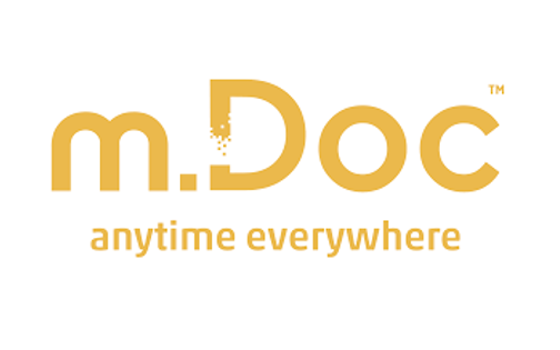 "Everyone talks? We do" is this year's slogan of the WeDoDigital campaign initiated by the German Chambers of Industry and Commerce - a campaign that aims to honor digital success stories in 2017. Cologne-based, digital healthcare company m.Doc is one of the nationwide winners. The award was given to m.Doc's founder and CEO Admir Kulin at the G20 Young Entrepreneurs' Alliance Summit in Berlin yesterday.
"Everyone talks? We do" is this year's slogan of the WeDoDigital campaign initiated by the German Chambers of Industry and Commerce - a campaign that aims to honor digital success stories in 2017. Cologne-based, digital healthcare company m.Doc is one of the nationwide winners. The award was given to m.Doc's founder and CEO Admir Kulin at the G20 Young Entrepreneurs' Alliance Summit in Berlin yesterday.
Admir Kulin, Founder and CEO of m.Doc, says about the award: "m.Doc is very happy to be among the nationwide winners of the WeDoDigital campaign 2017, organized by the German Chambers of Industry and Commerce. We hope that our business model, ideas and innovations might encourage other companies to follow a path into the age of digitalization. There is still a great lack of digital innovation, especially within healthcare, which is unfortunate as both the need for it, and the potential from it, are very high."
Underlying the m.Doc CEO's statement is the huge demographic shift within European society which greatly affects the healthcare sector. People are getting older. They want to stay fit and active for as long as possible. Being retired no longer means to sit still at home, but to actively enjoy life and leisure time or to play with your grandchildren. Coincident with this demographic shift, there is a lack of both general and specialist physicians that urgently needs to be addressed. "It becomes quite obvious that we have to use existing resources much more efficiently in the future and I truly believe that this will only be possible with the digitalization of the healthcare sector, including the use of telemedicine," Kulin states. That is also one of the drivers behind m.Doc's healthcare platform, which makes connected health a reality. m.Doc utilizes modern communication tools like video and messaging to connect patients with their doctors anytime, everywhere. In addition, data sharing between medical devices, wearables, third-party apps and the platform ensures a holistic patient profile that facilitates complete medical care where needed: at the point of care.
About m.Doc
'Connected Health' has become reality with the m.Doc mHealth platform. m.Doc can be deployed in a range of situations across economic sectors and segments, via established communication channels like video and messaging, via data sharing between medical devices, wearables and existing apps or via applications specially developed for easier physician use in a practice or hospital setting. The goal is for the focus to be on the patient, who is afforded the possibility of receiving physician care from any where and at all times - be it on the road, in an aeroplane or on a boat or train. m.Doc is also about connecting qualified partners with the solutions and systems that comprise a viable platform. Usability/user-friendliness for all parties and users is a top priority alongside quality, safety, data security and reliability.
m.Doc was founded in 2016 by an experienced group of entrepreneurs based in Cologne. The company's growth plans involve in part strategic partnerships with such prominent corporations as GE Healthcare and Telekom.